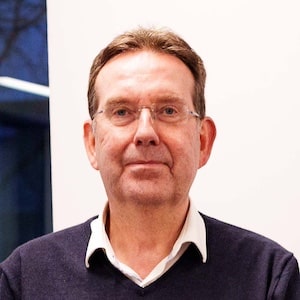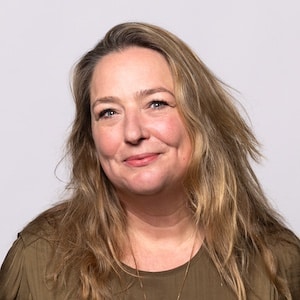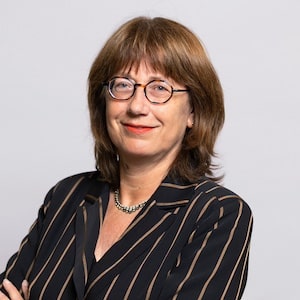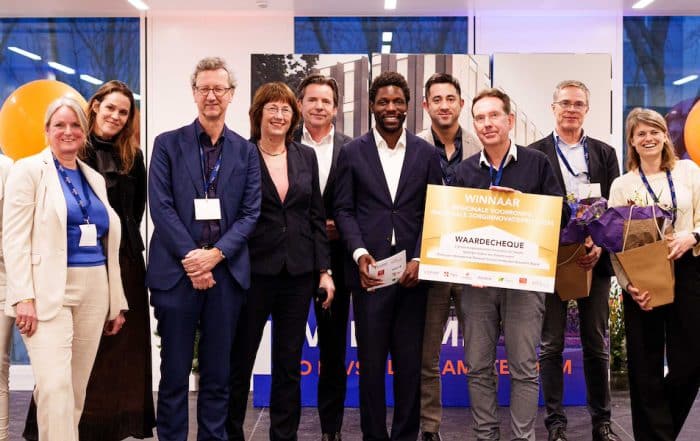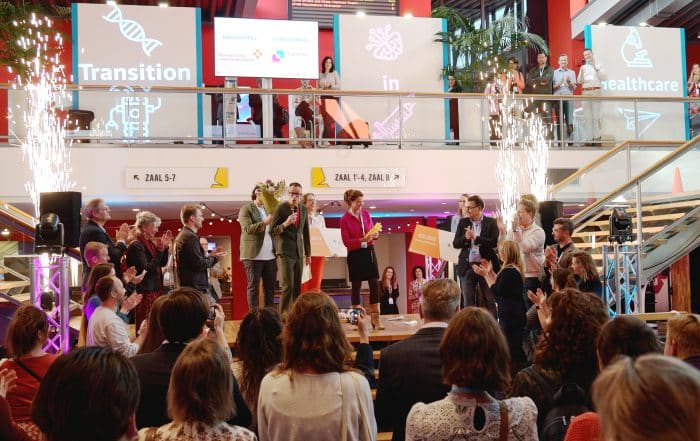Ellogon.ai is ready to conquer health market
Which cancer patients would benefit from immunotherapy? The AI tool EIDOS by healthcare innovation startup Ellogon.ai helps doctors answer that question. Director Robert Kuipers: "If we don't adopt technology permanently in health care, our system will come to a grinding halt."
Ellogon.ai has had a hectic few months. In February, the company won the regional preliminaries of the Zorginnovatieprijs. In doing so, they also won a year-long membership with our Network Council. Their AI solution EIDOS helps medical specialists select patients for immunotherapy. Ellogon.ai developed the tool together with the Netherlands Cancer Institute, among others. The product has already obtained CE certification. Now, four Dutch academic hospitals and one Greek hospital are working to implement the tool.
The Amsterdam startup raised one million euros from investors ROM InWest and UvA Ventures. In addition, managing director Robert Kuipers spoke with potential investors in Europe and the United States. The day after this interview, he will fly to Greece to visit one of the hospitals that will implement EIDOS. In between, he is busy expanding the number of employees at Ellogon.ai. “Never a dull moment,” Kuipers laughs euphemistically.
A new investment round is imminent. Is finding investors difficult?
“There is no shortage of attention for our company, also because we are past the pioneering phase. But the investment climate in Europe is very cautious, especially compared to the United States. There, what matters is: having a good team and a big enough market. In Europe, your turnover comes first and giving insight in what customers will pay for it. But before you reach that point, especially in healthcare, you’ll be busy for a number of years. The rules are strict, you need CE certification. And all that takes money. As a venture capitalist, you should dare to take a certain risk. Because without risk, we could also turn to the bank for financing.”
You’ve started as the head of Ellogon.ai in 2021, with one employee. You grew the company to fifteen employees. How did you do that?
“I came from another healthcare startup and had also worked for a startup before, so I know this entrepreneurial phase pretty well. Focus is a critical success factor for a startup. Ellogon.ai was looking at the wider field of oncology until my arrival. We have since focused on immunotherapy. We turned our attention on recognising characteristics in tumor tissue, so-called biomarkers. If you can recognise these, you can also determine whether a patient will benefit from immunotherapy. We then used those biomarkers to train our model. Now this can help pathologists determine which patients are suitable. Immunotherapy is a very expensive and invasive therapy. If you can prevent people from undergoing therapy which would have no effect on them, you will save a lot of money and prevent suffering.
We also started preparations to obtain CE certification. This proofs we meet all European requirements for healthcare equipment. I knew this would be a lengthy process. Many startups postpone their application and find they cannot go to market until much later than they would actually like.”
You developed EIDOS together with the Netherlands Cancer Institute (NKI) and you’re based at the Amsterdam Science Park. What do you gain from these networks?
“An awful lot. The NKI and its Antoni van Leeuwenhoek Hospital are at the global top. Everyone relevant to us knows them and they know everyone. This also gets us into academic centers that in turn can provide access to research data. Through the Science Park, we are in close connection with the University of Amsterdam, of which we are also a spinoff. The UvA is a leader in the field of AI. That AI image also reflects positively on us.
“Proximity is a significant factor. Every Monday in our office, we speak to pathologists and other medical specialists about how they can use EIDOS in their work. And how they select patients for immunotherapy. Each physician has their own way, so we learn a lot from those conversations. We are also investigating whether we can give immunotherapy much earlier, precisely because it is so effective. But to which patients? And when? Those are questions we can only answer after research and in close collaboration with doctors to translate them to our tool. With healthcare startups, you often notice that the focus is too much on technology. But actually, you have to constantly ask yourself what is the problem you’re solving. You need a network for that.”
What is needed to move that technology forward? Beautiful, promising initiatives now often get stuck in the concept phase.
“On the one hand, there is the complicated healthcare landscape: as a healthcare innovator, you have to know your way around financing, subsidies and regulations. The Amsterdam Economic Board could show entrepreneurs the way, like incubators do. Perhaps with a supporting programme. On the other hand, many startups still think too much in terms of technology, as I just said. I think you need to explain what problem in clinical practice your technology solves.”
In the regional preliminaries of the Zorginnovatieprijs, you also won a one-year membership to the Network Council. How do you think this network can help you? And vice versa: what will you bring to the table?
“The Amsterdam Economic Board provides a much broader network than the one we are in. From mayor and councillor of Amsterdam to companies that may not be involved in healthcare at all. Those relations can also be of interest to us, and such a network lowers the threshold for getting in touch.
“Health is an important theme for the Amsterdam Economic Board and we have a lot of knowledge and experience to share on that. I know the barriers of our health care system, important developments, but above all the big challenge: our system will come to a grinding halt if we don’t start using technology quickly. Artificial intelligence is a good example. It can help with diagnostics, can be highly accurate and runs 24/7.”
Before 2025, EIDOS will be used in clinical practice, you said. Where will Ellogon.ai be in five years?
“Of all the hospitals in Europe that use immunotherapy, 20 percent will then use EIDOS. We will have really been able to demonstrate that we are saving a lot of money by doing this. My big dream is that in five years we will be developing better cancer drugs with a large pharmaceutical institution and a large academic institution. Because AI can help with that, too.”
Text: Mirjam Streefkerk
Get a seat at the table?
Would your organisation like to team up with regional leaders and achieve your sustainable, innovative ambitions? Read about the Network Council and contact Marjan Schrama.
26 April 2024
Read more about
Contact us
Want to keep up to date?
Get the best regional news and events (in Dutch) via the Board Update newsletter
Share this news
Want to keep informed?
Follow us daily on LinkedIn and sign up for the Board Update newsletter.
Read more
- What AI applications are we already deploying for healthcare and wellbeing? What ...
- Adyen is one of the great success stories of Amsterdam’s tech ...
- Together with enthusiastic partners in three coalitions, the Amsterdam Economic Board is ...

